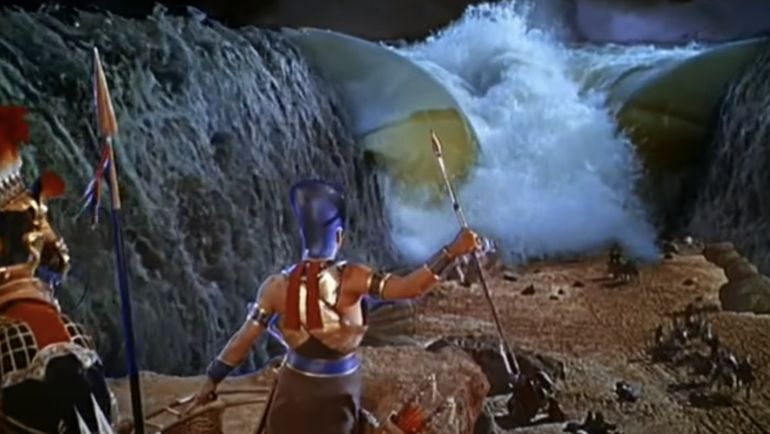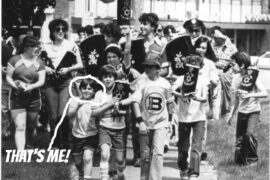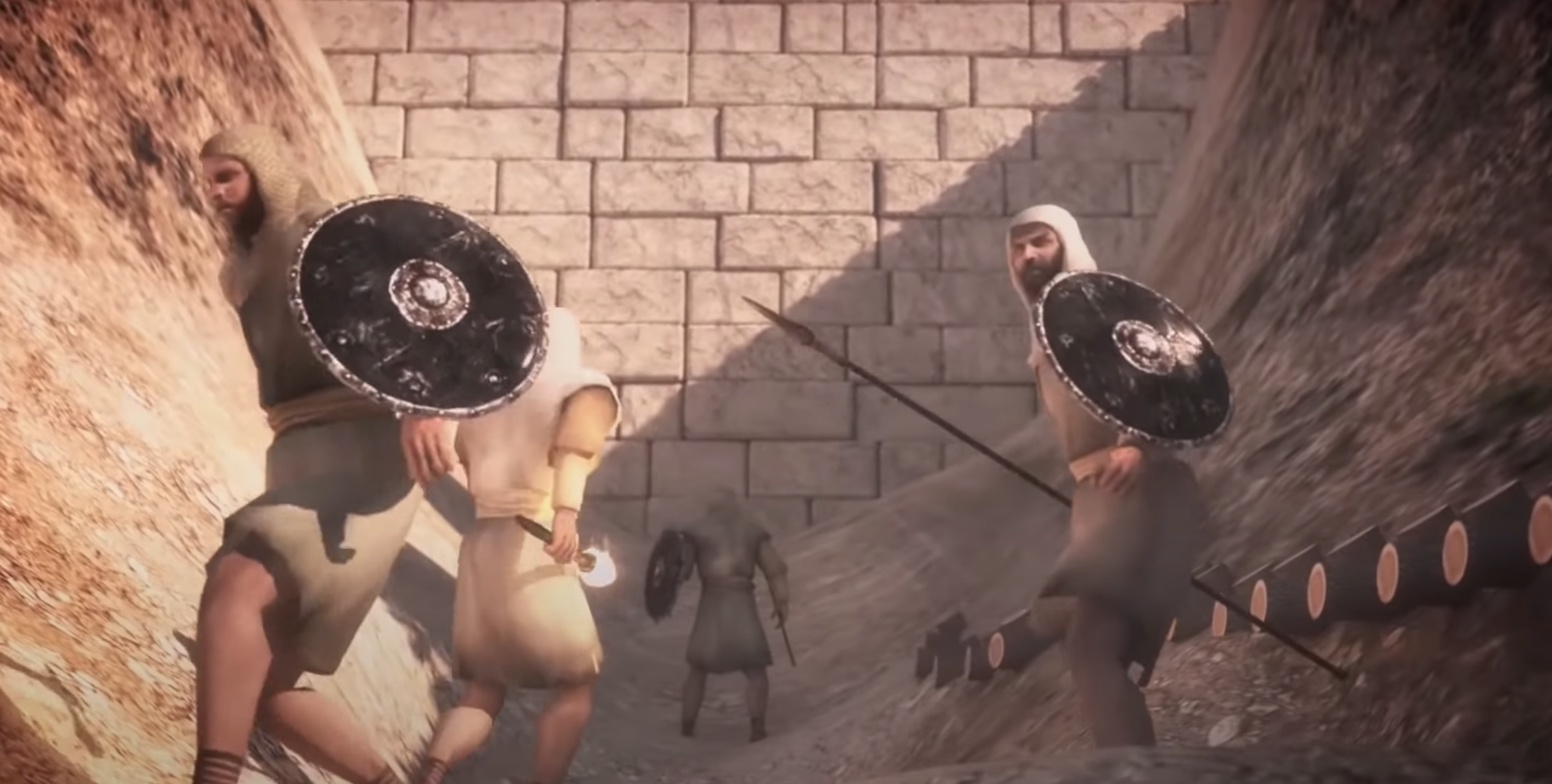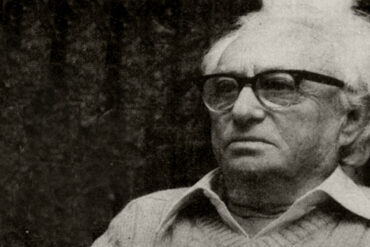Why couldn’t the numerically superior Hebrews fight Egypt at the Sea of Reeds?
If the Torah shares Israel’s collective soul, why was it necessary to be given in the form of a “rule book”?
Who was Yehoshua and what about his background made him capable of leading the war against Amalek?
Following a premature material liberation from slavery, Israel required a gradual process of psychological liberation in preparation for the Brit Sinai.
“The Hebrew Identity” podcast draws upon teachings from Manitou (Rav Yehuda Ashkenazi), Rav Kook, and many of Israel’s ancient sages to present the evolving story of the Hebrew tribes, as seen in the weekly Torah portion. The series focuses on what the unique challenges and personal growth of various Biblical personalities can teach us about our present day struggles.
For more content from VISION Magazine, subscribe to our newsletter and follow us on Twitter @VISION_Mag_, Facebook and YouTube. If you haven’t already, don’t forget to subscribe to our podcast on SoundCloud, iTunes, Stitcher, TuneIn, or Spotify and leave a rating and review to help us get our message out to a wider audience!
To support the podcast, head over to our PayPal portal and be sure to write a note that your contribution is for the podcast.
Hosted by: Yehuda HaKohen
Transcript:
Parshat Beshalaḥ opens by showing us that although the children of Israel had physically left Egypt, they still suffered from a slave mentality. The Torah tells us immediately in the first verse of the parsha – Sh’mot 13, verse 17 – that the Creator led the Hebrews on a long detour rather than straight into the Promised Land because the former slaves were not psychologically prepared to fight a war.
Verse 18 tells us that the Hebrews went up out of Egypt armed. But the word armed – “ḥamushim” – is also grammatically similar to ḥamesh – the number five. The Midrash interprets ḥamushim to mean “reduced to one fifth,” meaning that only one fifth of the Hebrews actually went free while eighty percent of the nation died during the ninth plague of darkness because they had wanted to remain in Egypt. Even if we don’t take this Midrash literally, we should still take the point that the purpose of the Exodus was incomplete.
Because the amount of time the Hebrews were enslaved to Egypt was cut from 430 to 210 years – although the Exodus was still exactly 400 years from the birth of Yitzḥak (and 430 years since Avraham received the prophecy of Israel’s bondage) – the Exodus didn’t reach the potential originally intended for it.
It’s of course difficult for us to think in terms of HaShem having to change His plan because HaShem is not only the Author of history but also the Creator of time and therefore exists outside of time. The Creator always knew that the Exodus would take place exactly as it did yet He also wants us to know that a deficiency in Israel caused it to not occur in its ideal form.
Because the Hebrews were incapable of enduring and maintaining our identity during the full 430 years of intended slavery, the time was significantly shortened. But Manitou teaches that as a result of Israel’s premature exit from Egypt, the Yetziyat Mitzrayim – which literally translates into English not as “the Exodus from Egypt” but rather as “the Exodus of Egypt” – took place at a much lower scale than what would have been ideal.
The ideal would have been for all or at least most of Egyptian society to join Israel in the same way that the erev rav did and for the entire civilization to free itself of the Egyptian ideology and join Israel’s mission. If the Egyptians had underwent this gradual transformation, the Hebrews would have been freed well enough in advance of leaving Egypt and would have already had the psychological freedom to travel directly to the Land of Israel.
This ideal complete Yetziyat Mitzrayim would have seen the children of Israel enjoying the same relationship with Torah that the patriarchs and matriarchs enjoyed. We would have experienced the Torah as our internal nature and not as an external set of laws coercing our behavior.
But because the Hebrews needed a premature material liberation, we came out of Egypt still requiring a careful process of psychological liberation. And a central part of that process required Israel to receive the Torah as a legislative set of rules.
Having been liberated directly from slavery, Israel required the ostensibly external imposition of strict laws. That’s what the Hebrews were used to, which is part of what made Moshe the ideal leader at that time. The former slaves required a harsh leader raised as Egyptian royalty with a special affinity for legal structure. So the Torah, which had existed since well before Creation and even shares Israel’s national soul, had to be revealed in our world in the form of a rule book. But because the Torah actually is our true collective inner self, Israel will eventually return to living it intuitively as our nature.
Sh’mot 13, verse 19 tells us that as the Hebrews left Egypt, Moshe made sure to take the bones of Yosef to eventually be buried in Shkhem. As we discussed in our episode on Parshat Veyeḥi, this was important to Yosef as a way of correcting his earlier attempts to fulfill the Hebrew mission through Egypt.
As the children of Israel left Egypt, HaShem sent a pillar of cloud to guide us by day and a pillar of fire to lead us by night. For three days we traveled from Rameses to Sukkot to Eitam to Pi-Haḥirot, which translates literally into English as the “mouth of freedom.” This constant day and night movement without rest reflects the nation’s accelerated transformation.
Then HaShem told Moshe to keep Israel in place in order to lure Pharaoh and the Egyptian military after them. In Sh’mot 14, verse 4, we see HaShem telling Moshe that He would again stiffen Pharaoh’s heart and cause the Egyptian army to chase after the Hebrews in an attempt to recover the kingdom’s slaves. A final confrontation was necessary not only to psychologically separate Israel from Egypt definitively but also to sufficiently intimidate Egypt so that the empire wouldn’t intervene on behalf of its Canaanite vassal states during Israel’s eventual conquest of the Promised Land.
Sh’mot 14, verse 6 shows us the extent of Pharaoh’s exceptional leadership qualities. Despite everything that had happened to Egypt over the last year, the king was able to galvanize and inspire his army after him in pursuit of Israel.
When the Hebrews saw the six hundred Egyptian chariots approaching, they cried out to HaShem. But these cries quickly transformed into complaints to Moshe. Israel was caught between the Egyptian military and the Sea of Reeds and, in verse 12, the former slaves expressed a preference for returning to their former masters rather than be killed in the wilderness.
The Ibn Ezra points out here that the Hebrews greatly outnumbered the Egyptian forces and asks why Israel was so frightened. He asks:
“How could a camp of six hundred thousand men fear their pursuers? Why should they not fight for their lives and the lives of their children? The answer is that the Egyptians had been Israel’s masters. The generation leaving Egypt had learned from childhood to endure the Egyptian yoke and they possessed a low soul. Being weak and unaccustomed to warfare, how could they now fight against their masters?”
The Ibn Ezra further teaches that the Creator would arrange for all the males who had left Egypt to die out over 40 years in the desert because they had lacked the inner strength to fight a war of liberation. A new generation unencumbered by this low soul needed to rise up before Israel could enter the land.
This experience of impending mortal danger and the ultimate deliverance that would follow became an essential part of Israel’s reeducation. Because Moshe, unlike the nation, was convinced that HaShem would save them, he told the people to stand back and watch what would take place. But then in verse 15 we see HaShem tell Moshe explicitly that Israel must take action and move forward into the sea. This would be a key moment in Israel’s psychological liberation.
But because the Creator wanted Israel to trust Moshe’s leadership, He instructed him to lift his staff over the sea to make it appear as if Moshe was causing it to split. The pillar of cloud and pillar of fire then joined together between the Hebrew and Egyptian camps in order to provide light for Israel and enshroud the Egyptians in darkness.
Like the previous ten plagues, this event would have a far more profound impact on Egypt than on Israel. The Egyptian warriors would experience an intense paradigm shift and recognize the power of the Hebrew God – even if only at their final moments before death. Israel was still at this point so deeply psychologically enslaved that they saw the world and themselves through the eyes of their former masters. And they were only able to perceive HaShem’s power through Egypt’s recognition of it.
Our Sages teach that Naḥshon ben Aminadav, a chief of the Yehuda tribe, was the first to enter the sea and that the sea only parted once the water reached his face. This shows that certain Hebrews were already starting to free themselves from their former passivity.
Sh’mot 14, verse 21 states that “Moshe stretched out his hand over the sea and HaShem moved the sea with a strong east wind all night and He turned the sea to damp land and the water split.”
And the next verse states that “The children of Israel went into the sea on dry land and the water was a wall for them on their right and on their left.”
Manitou points out that this description of events presents us with a certain duality. Stating that HaShem drove the sea back with a strong east wind might have made it seem like a natural event. But the waters forming a wall on either side of the Hebrews seems clearly miraculous. This reflects two different perceptions within Israel of the same experience. Some of the Hebrews had perceived the event as merely the wind blowing the sea while others experienced what was happening as undeniably miraculous and supernatural.
Such different assessments of the same event is actually common because the Creator runs the world in such a way that we can perceive events as either natural or miraculous, depending on our own perceptions of reality. We can choose to see the world through a lens that makes nothing a miracle or we can choose to perceive reality in such a way that makes everything miraculous. The choice is really ours.
Our Sages teach that while crossing the sea, one Hebrew even complained to another about the mud on his feet. But once arriving on the other side, the entire nation had a collective prophetic experience. The Egyptians had pursued them into the sea and were ultimately drowned. Seeing the Egyptian military completely destroyed, the Hebrews suddenly burst into prophetic song.
The Mekhilta teaches that even the handmaid saw on the seashore what Yeḥezkel ben-Buzi and other prophets didn’t see.
The children of Israel temporarily rose to a level of prophecy where they all understood Ma’ase HaMerkava – the content of Yeḥezkel’s vision. This experience of collective nevua, like a lightning flash in the dark, took place on the night of the 21st of Nisan – the Shvi’i shel Pesaḥ – and marked the culmination of the Exodus. And it became a festival on the Hebrew calendar for all time.
This collective experience of temporarily seeing behind many of Creation’s veils and gaining insight into HaShem’s Divine plan was imprinted on Israel’s collective consciousness for all time.
Even when later subjugated by foreign nations or by our own transgressions, the imprint of this momentary prophetic experience on our national soul provides us with the inner strength to break our chains. It didn’t eliminate the potential for failure but that seven day formative Exodus experience endowed Israel with eternal resilience. Although future generations might stumble and fall, we would always have the ability to rediscover our true collective self and rise up.
But despite all this, the splitting of the sea and destruction of the Egyptian armed forces was actually a much more significant event for the international community than it was for Israel.
Despite the fact that it was a momentary experience of collective national prophecy and marked the final psychological separation of Israel from Egypt, the Hebrews very quickly resorted to narrow thinking and complaints.
But from the perspective of other peoples and civilizations at the time, the shattering of Egyptian economic, military and ideological power was a monumental event of international significance.
When the Creator intervened in history and destroyed Israel’s enemies, this left a major impression on the world. Israel’s prophetic Song of the Sea actually emphasizes this when addressing the reactions of various nations to the event. And even 40 years later, when two Hebrew spies would enter the city of Jericho, we see in Yehoshua 2, verses 9 through 11 that the people were in fear of Israel due to what had happened to the Egyptians at the sea.
But Israel by contrast – despite the prophetic experience that made a lasting imprint on our soul – does not appear to have gone through any surface level transformation of consciousness. As soon as difficulties arose, the Hebrews expressed a mentality of only seeing the mud on their feet.
In the relatively short journey from the seashore to Sinai – where Israel actually would undergo a more perceivable transformation – a number of minor crises took place. These included complaints over undrinkable bitter water at Mara, the lack of food to eat in the wilderness of Sin and a water shortage at Rephidim. In each of these instances, the Creator displayed patience to the former slaves, relating to their complaints as valid and continuously providing for them in a way that advanced a necessary growth and elevation process. This included the introduction of the man, the concept of Shabbat and even water bursting forth from a rock.
But then the Hebrews were attacked by Amalek. While most nations had been intimidated by Israel following Egypt’s destruction, the Amalekites had no fear because they saw themselves as rightful heirs to Avraham and Yitzḥak. Amalek was the grandson of Esav, who’s descendants believed their birthright to have been stolen by Israel.
Our Sages understand Esav as the spiritual progenitor of Western civilization. And if Esav is the West, we should see Amalek as the most militant and self-aware part of that civilization, that identifies Israel as a threat and seeks to remove us from the world. In modern times we can identify white nationalist movements as contemporary expressions of Amalek.
In Sh’mot 17, verse 9, Moshe instructed Yehoshua bin-Nun to select and lead soldiers into battle with Amalek. Yehoshua was a leader of the Ephraim tribe, which is one of the sub-tribes of Yosef. As we learned in our episode on Parshat Vayetzei, Yosef is the part of Israel that possesses the power to be like Esav and to defeat Esav – making Yehoshua an appropriate choice to lead the battle.
The fact that Moshe was even instructing Israel to fight demonstrates a significant advancement from the state of the nation at the Sea of Reeds. It may also be noteworthy that the Torah very abruptly introduces Yehoshua and presents him as a capable military leader. This sharply contrasts with the Torah’s general depiction of the newly freed Hebrew slaves.
In our episode on Parshat Vayeḥi, we spoke about Yehoshua’s father Nun and his likely participation in a premature slave revolt. There’s also a Midrash that Yehoshua and some of Yosef’s other descendants never actually became slaves but remained close to the Egyptian ruling class. According to this understanding, these tribesmen of Yosef even owned properties in the Land of Israel, which was at that time under Egyptian control. The Midrash says that Yehoshua was born in Jerusalem, and served as a mercenary in Pharaoh’s army, which might explain why Moshe appointed him as Israel’s military commander.
But why didn’t Moshe lead the army himself? Rav Kook teaches that Moshe couldn’t personally lead the war against Amalek because Moshe’s nevua showed him all of history in its full eternal context. Moshe understood that every force of evil – even and especially Amalek – has an important unique function in Creation. To a certain extent, the world needs Amalek to serve as a counterforce to Israel. Even Israel requires that conflict for our own proper development. Because Moshe was aware of his own ability to appreciate the positive role Amalek plays, he selected Yehoshua to command the battle in his place.
In D’varim 25, verse 19, HaShem would instruct Israel to wipe out Amalek’s memory from under the heaven. This memory refers to those who act as living reminders of Amalek – those who continue its work must be destroyed. There is no place for Amalek under heaven. But above heaven, in the higher worlds, there is a place for everything, because there it becomes clear how even evil plays a positive role in the Divine plan. Because Moshe was able to see that, he wasn’t the appropriate choice to lead the fight.
But during the battle, Moshe stood atop a nearby hill together with Aharon and Miriam’s son Ḥur. When his arms were raised, Israel would prevail but when his arms grew tired, Amalek would gain the upper hand.
Our Sages explain that only when the Hebrews turned their thoughts upward and hearts to HaShem did they prevail. Moshe’s raised arms served as a banner. When the Hebrew fighters saw them, they were inspired and empowered with the awareness of their place in HaShem’s plan. But when Moshe lowered his arms, the people would lose sight of their destiny and become weak.
Sh’mot 17, verses 11 and 12 demonstrate an innate interconnection between Moshe and Israel. The position of Moshe’s arms reflected Israel’s level of emuna. Just as Moshe’s arms supported the emuna of the nation, so did the nation’s emuna strengthen his arms. When the fighters grew weak, Moshe had difficulty keeping his arms up. So Aharon and Ḥur had to support them in order for Yehoshua to succeed.
But Amalek was only weakened, not fully destroyed. The conflict was left unfinished.





